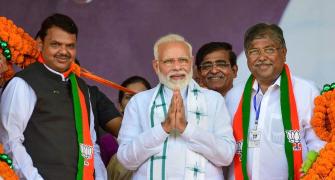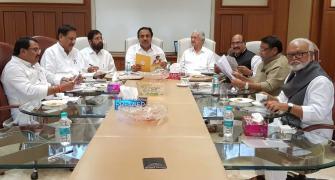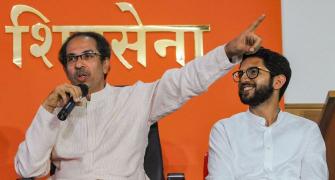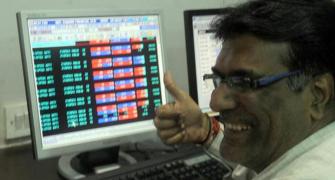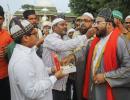By ending the Shiv Sena's political untouchability, the Congress is creating a level playing ground for itself in the political battle of Hindu identity, explains Sheela Bhatt.

Who will form the government in Maharashtra?
Before any logical assessment of this question, let's understand what is at stake.
At stake is the credibility of Amit Anilchandra Shah, the Bharatiya Janata Party president and India's home minister.
Shah is in the crosshairs of Uddhav Thackeray, the Shiv Sena president who alleges that before the assembly election, in a one-on-one meeting with him, Shah had promised that the post of chief minister would be rotated between the BJP and Shiv Sena.
The truth is known only to Uddhav and Shah and impossible to establish as it's one's word against the other's. Still, in his wisdom, Uddhav thought of taking on Shah in the public sphere.
After the assembly election results were out on October 24, what exactly made Uddhav completely lose hope of forming a government with the BJP when the alliance had a comfortable majority, so much so he raked up something that can only end in finally breaking the 30-year-old alliance?
Did the alliance almost break much before Uddhav came out in the open to take Shah head-on?
Is this the Shiv Sena's way of winding up the Hindu ideological alliance which had turned toxic?
Knowing Shah's politics and personality since 2014, it is easy to decipher that a BJP-Shiv Sena government in Maharashtra is an impossibility now unless Uddhav apologises unconditionally to Shah.
Meanwhile. Shah is sitting pretty in Delhi. It is a foregone conclusion, given the current political set-up in New Delhi and Shah's grasp of and grip over it, that Prime Minister Narendra Damodardas Modi and the BJP will stand rock-solid behind Shah when he confronts Uddhav's challenge.
Maharashtra, one of the important states in terms of politics and resources, is looking shaky today in the absence of a government, but Shah has not visited Maharashtra after the election results and has spoken only once, to ANI, to defend Governor Bhagat Singh Koshyari's position when he came under attack for recommending President's Rule in the state.
Asked why Modi and Shah are completely silent on Maharashtra developments, a senior BJP leader said, "Shah is confident that he has read the situation correctly."
This can be interpreted as the BJP's confidence about the final outcome.
Meanwhile, the BJP is patiently watching the ongoing political deliberations, which are quite riveting and revealing, among the Shiv Sena, Congress and Nationalist Congress Party in Mumbai.
As soon as the assembly results emerged, two facts became important for the BJP.
The Shiv Sena got just 2 seats more than the NCP and a much lower strike rate compared to the BJP.
The BJP won 105 of the 152 seats that it contested, a strike rate of 70%.
To the Shiv Sena's shock, around 15 BJP rebels won the election, some of them defeating its candidates and some even defeated the BJP's official candidates.
It is known that before the election both sides fought a bitter battle behind the scenes, with both the Shiv Sena and BJP covertly launching and supporting their party rebels and Independents against each other's official candidates.
Modi and Shah have been a target of Sena barbs for the last five years.
The BJP was beaten badly in Vidarbha due to anti-incumbency, rural distress and caste factors, but urban Maharashtra gave it a respectable position.
The result showed that in spite of a Brahmin, Devendra Fadnavis, leading its electoral charge in the Maratha dominated land of Maharashtra, the BJP maintained its lead position.
In the next election, if the BJP plays its OBC card well, it can even think of venturing without the Shiv Sena.
Shiv Sena Rajya Sabha MP and Saamna Executive Editor Sanjay Raut's virulent attack against Shah came about after the Sena's internal assessment that the wily BJP would do everything possible to further obstruct and slice the Sena by the next election.
In view of these calculations the Thackeray family sees 2019 as its last confident chance to enter power politics without a proxy.
Also, before understanding what the Congress-NCP is doing to and with the Sena, do understand that the BJP needs around 25 more MLAs to reach the majority of 145 seats in the 288-member assembly to form a government. The BJP claims it has 105 plus the support of 15 Independent MLAs.
In New Delhi, the BJP top brass's assessment of the Congress high command is that the 'secular' party was never confused about support to the Shiv Sena and NCP.
However, the Congress has done enough to create a perception that while its President Sonia Gandhi does not want to support an ultra Hindutva party like the Shiv Sena, its state unit is desperate and hence she has allowed her party leaders to negotiate how to be partners in power.
As a Thackeray's premier entry into government cannot be at the lower level, if the Congress goes all out to help a Thackeray be sworn in as chief minister in a well-knit arrangement by the NCP, it will be another shilanyas, like the one in 1989 when the Congress believed it could win the Hindu vote by permitting a shilanyas in Ayodhya, but ended up ceding political ground to the BJP for 30 years.
But it will have the short-term advantage of rattling the BJP, for sure.
The BJP's propaganda machinery at the national level will do all it can to send out the message that in Indian politics, secularism is now truly dead.
If a provincial party that brought in unmentionable abusive words into the national discourse against Muslims is partnering the Congress, it will not be a small event.
A defensive BJP would say there is nothing more joyous for the Rashtriya Swayamsevak Sangh than the Congress entering the broader Saffron bracket.
The formation of the unthinkable Sena-NCP-Congress nexus will have a magical impact on national politics.
Those Congressmen who are eager to get a slice of power in Maharashtra claim that by supporting a Shiv Sena-NCP government from the outside, the Congress is endorsing Modi's idea of a 'Naya India'. But it will be a Naya India where the BJP's monopoly over the Hindutva vote will be challenged with a new hybrid political model.
It will lead to a no-holds-barred fight which will spill over into the national battleground as Maharashtra is too big a state for the BJP to lose.
There are some decisions in politics which look completely suicidal to one set of people and highly wise to others. This is one such move if the Sena-NCP-Congress axis becomes a reality and forms the government in Mumbai.
If the BJP can go to any length to capture power in state after state, the Congress has reminded one and all that it too has an institutional memory of how to remain in power at any cost.
When the abrogation of Article 370 was opposed by the Congress in Parliament, within days it felt the ground shaking beneath its feet.
After the Ayodhya judgment, it was so wary of being politically correct that it went a step further and declared that it favours the building of a Ram temple at the disputed site.
By expressing a desire to support the Shiv Sena, the Congress has taken a practical step like Modi-Shah had done when the BJP entered into an alliance with the Peoples Democratic Party in Jammu and Kashmir. RSS leaders were displeased by the move, but Modi-Shah went ahead.&
There is realisation in the Opposition that the aggression and passion of Modi-Shah's politics is multi-layered and the Congress can't play the game without taking issues head-on. By ending the untouchability of the Shiv Sena, the Congress is creating a level playing ground for itself in the political battle of Hindu identity.
The BJP could be hit at many levels.
A former Maharashtra chief minister argues that if Eknath Shinde of the Shiv Sena and Sushil Kumar Shinde of the Congress could discuss power-sharing, then it means somewhere the BJP's arrogance should be blamed.
Two, there was underlying tension between the Gujarati-dominated BJP and the ethnic Maharashtrian Shiv Sena. In provincial politics, nothing is more powerful than language.
NCP President Sharad Pawar and Uddhav Thackeray have a common language. Devendra Fadnavis is still more of a Modi-Shah protégé than anything else.
However, while these arguments have some weight, can the Congress-Sena-NCP seal a path-breaking alliance?
It will depend on Sharad Pawar.
The veteran -- who turns 79 on December 12 -- has emerged stronger from this election. The Congress is less relevant in the current political high drama. It is Pawar who has to take a call. So far -- repeat so far -- he has not given an inch to the Sena.
None of his deputies have said that the NCP is fine with the CM's post going to the Sena.
Pawar never sent the Sena the most important list of his MLAs when the deadline for the Sena before the governor was fast approaching.
Also, it is beyond logic to think that the NCP will have a better future in a hybrid secular-communal alliance.
Seeing his age, legacy, daughter Supriya Sule's political future and the many corruption cases that NCP leaders are facing, Pawar would judge his political advantage through the prism of his family and his party's future and not solely to teach the BJP a lesson.
He is in an enviable position. He knows for sure that the BJP-Sena' toxicity has crossed its limits and it's advantage NCP.
Also, knowing the speed with which Modi-Shah function, it is unthinkable that after the results they have not reached out to Pawar.
The BJP's smooth option would be to create the ground to meet the NCP after Parliament's winter session and seal a deal.
For the NCP too, a stable government and a more secure alliance would be with the BJP.
Teaching a lesson or two to the arrogant BJP does not seem to be Pawar's priority.
To be or not to be with the BJP is the question before Pawar.
If he finds a conclusive answer, only then can the dramatic power-sharing negotiations of the Congress-Sena-NCP move forward.
Also, why should the Congress, NCP and BJP not dump the Shiv Sena for a better positioning of their respective parties in Maharashtra politics?
Since the Shiv Sena declared war prematurely, it is giving everybody a chance to look out for their own advantage -- but at the Shiv Sena's cost.

